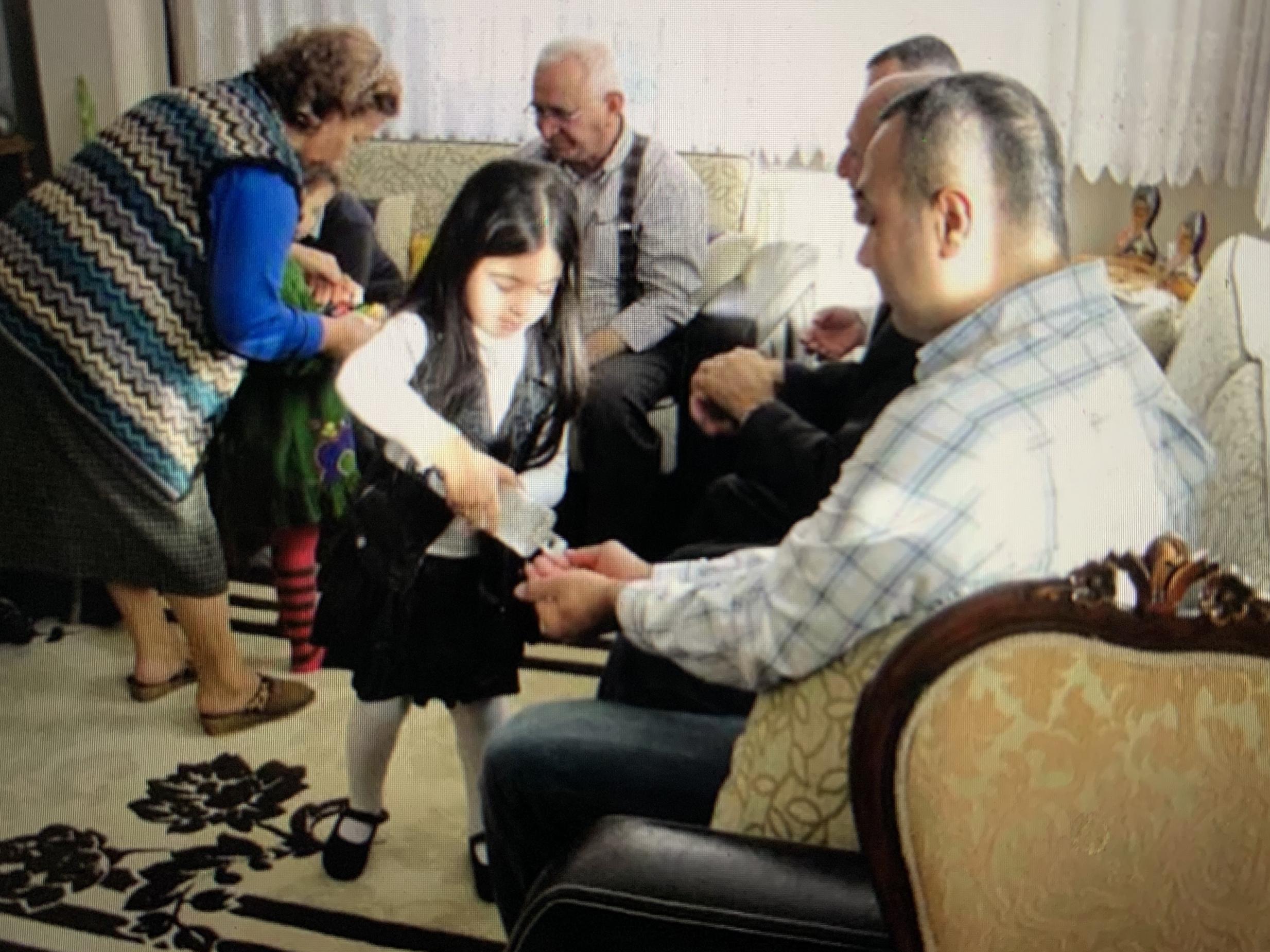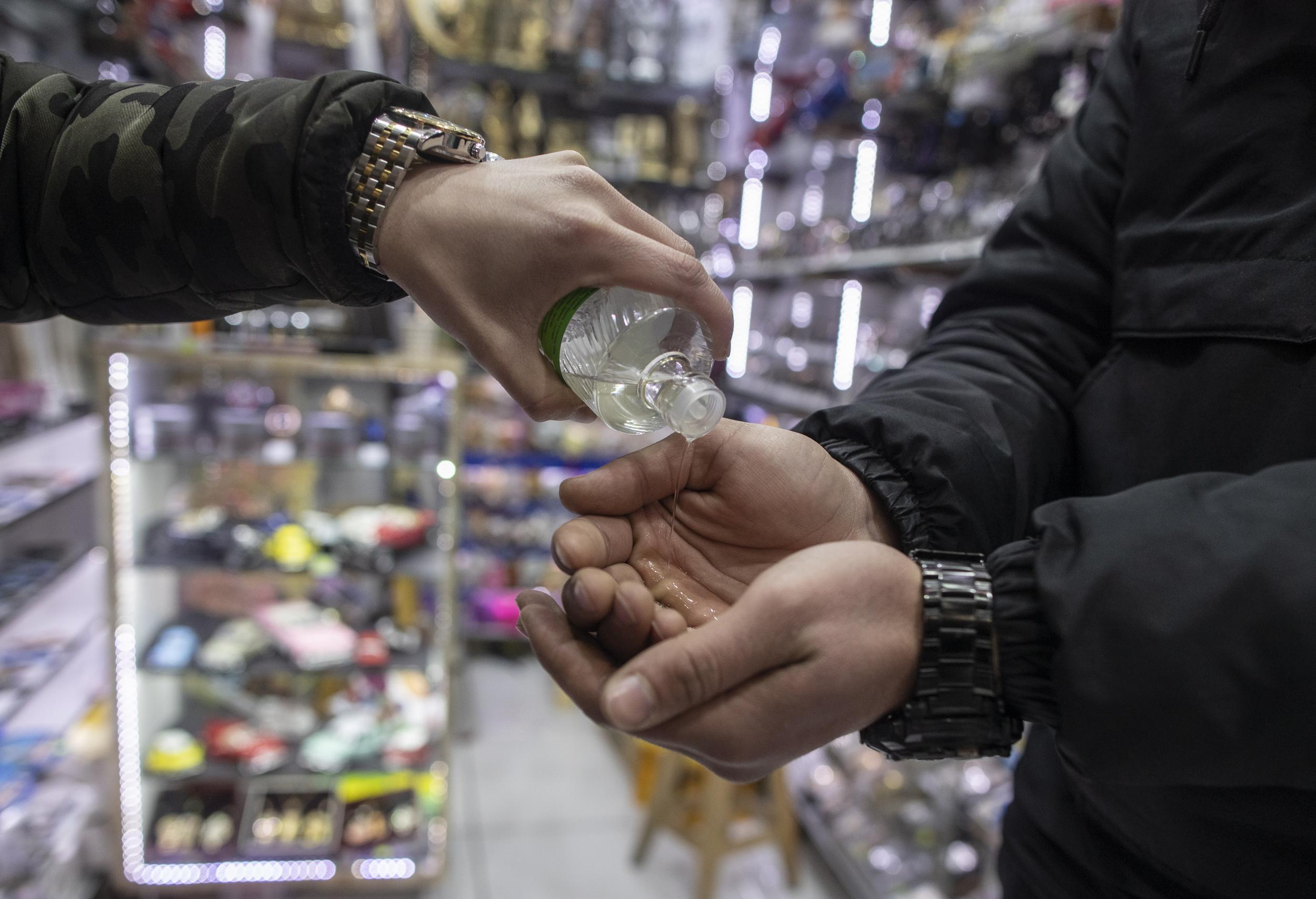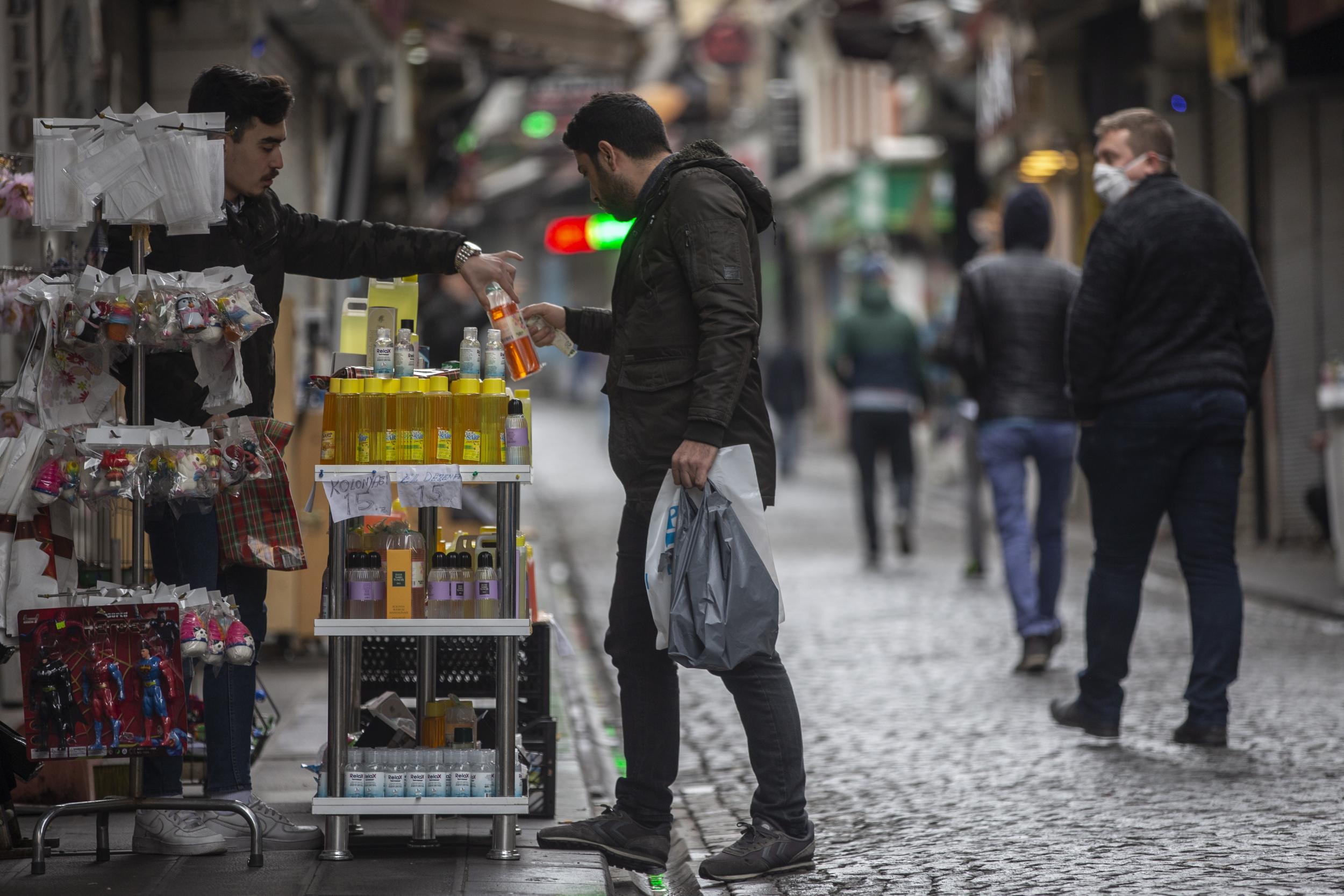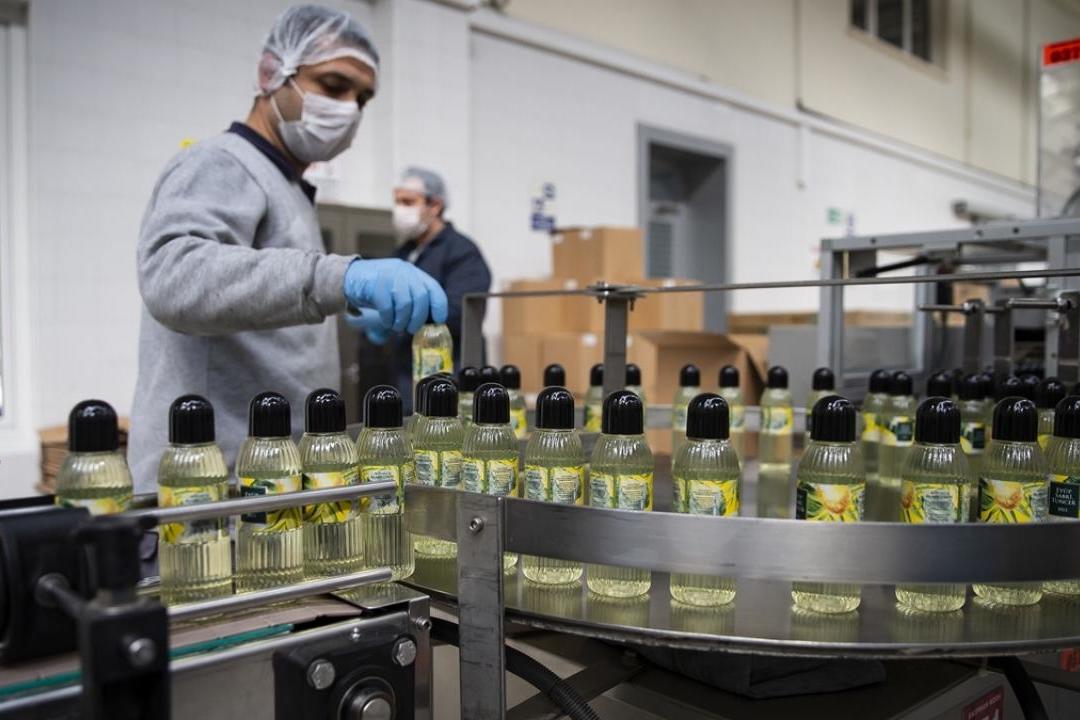Turkey’s sweet-smelling secret weapon against the virus
Sebnem Arsu reports on the unexpected return of Turkey’s traditional phrase: ‘Sweetheart, why don’t you offer our guests some kolonya?’


Your support helps us to tell the story
From reproductive rights to climate change to Big Tech, The Independent is on the ground when the story is developing. Whether it's investigating the financials of Elon Musk's pro-Trump PAC or producing our latest documentary, 'The A Word', which shines a light on the American women fighting for reproductive rights, we know how important it is to parse out the facts from the messaging.
At such a critical moment in US history, we need reporters on the ground. Your donation allows us to keep sending journalists to speak to both sides of the story.
The Independent is trusted by Americans across the entire political spectrum. And unlike many other quality news outlets, we choose not to lock Americans out of our reporting and analysis with paywalls. We believe quality journalism should be available to everyone, paid for by those who can afford it.
Your support makes all the difference.Who could have imagined that kolonya, a traditional Turkish sanitiser, long out of vogue with the young and urbane, was to make such a glorious comeback? Since Turkey’s Scientific Board listed the liquid, with its 80 per cent ethyl alcohol base, as an official preventive measure against Covid-19, suppliers have been out of stock and century-old kolonya brands have been working around the clock to meet growing demand at home and abroad.
Kolonya made its Turkish debut in the early 20th century long after the French reclaimed it following their battles with Germany in the late 18th century and called it eau de cologne, or “the water of cologne”. At home, it was a common gesture for the youngest member of the family to grab the chic kolonya bottle as soon as guests were welcomed in, gently pouring it into hands – starting from the elderly and garnering praise in return.
In side-street barbershops throughout Anatolia, it is still the final touch on clean-shaven faces, sizzling tiny cuts with refreshment and sanitisation. So is the case with public toilets when the person in charge sits on a small stool with a paper towel in one hand, kolonya in the other, assuring everyone leaves with clean hands. For decades, kolonya with its traditional lemon, lavender and tobacco flower scents had Turks under its spell, not least as a viable alternative to more costly perfumes.
“It was exclusively sold at pharmacies,” Nigan Bayazit, a retired professor of design, who studied kolonya bottles, explains. Its accessibility and affordability contributed to its widespread popularity.
In recent times, however, even if still used daily in rural Anatolia and by the elderly in big cities, the tradition mostly faded in urban Turkey and among younger generations. It might have been the traditional family lifestyle and its roles that the young rejected along with kolonya, Sebnem Timur, a professor of design at Istanbul Technical University, argues.
“This, ‘Sweetheart, why don’t you offer our guests some kolonya’ might have prepared the end of it,” she says, in reference to a 2007 academic study on kolonya habits to which she contributed. “For young individuals, who had a problem with traditional roles and wanted to become urbanised, modern, kolonya was part of the package with needle-work tablecloths, crystal bottles and classical ornate furniture that reminded them of an outdated lifestyle.”
In early March, however, their rejection was turned on its head when health minister Fahrettin Koca on live television quoted scientists working on the coronavirus outbreak saying, “The Science Council recommends kolonya, as long as it (alcohol level) is over 60 per cent.”
Even before his statement, people of all ages had already flocked to pharmacies, supermarkets and online platforms, quickly draining available stock. Long lines formed in front of kolonya shops as people waited to refill their plastic containers just as in old times.

“While kolonya was resting in your daddy’s leather slippers, it suddenly turned into a chevalier of medicine, dressed in green scrubs,” Timur says. Soon after, popular Bogazici Kolonyalari, increased production capacity to maximum level, with their manufacturing site working in three shifts seven days a week, Phillip Haas, the chairman says. Eyup Sabri Tuncer, one of the most prominent kolonya labels on the market started producing well over their 80,000-bottle daily capacity, breaking records seen at even the busiest holiday times.
“This is not about increasing business but producing in the spirit of national mobilisation at a time of war against a deadly threat,” Engin Tuncer, a third-generation chair of Eyup Sabri Tuncer says. “We own our leadership position and remain committed to not increasing our prices.”
Prices, however, depend on supplies of ethyl alcohol, kolonya’s main ingredient, imports that Pakistan, Iran, Russia and Brazil normally provide but froze due to the spread of the pandemic at home, suffocating markets at large. Underground producers picked up on the demand, releasing fake kolonya versions with methyl alcohol that have serious side effects such as temporary blindness, skin irritation and burns, certified producers warn. The Industry and Technology Ministry stepped in, gathering all kolonya producers for a series of fast-track meetings before announcing immediate measures to fill the gap in raw materials.

For three months, it lifted the petroleum sector’s obligation to mix their fuel with 3 per cent of ethyl alcohol, diverting resources to medical steriliser producers, the semi-official Anadolu News Agency reported on 13 March. Furthermore, ethyl alcohol production lines of Amasya and Eskisehir sugar factories, which treat sugar cane, wheat and sugar beet and previously stalled alcohol lines, were back in the business, reports say.
Good news for consumers young and old when Turkey has so far 1,403 Covid-19 deaths and 65,111 cases. “Like many others, my childhood is filled with memories of serving kolonya to guests but now I realise it was my grannies’ subtle way of sterilising people coming in from outside,” Zeynep Karakasoglu, a 40-year-old commercial scriptwriter, says. “Previously, I was not fond of it but am now using the lemon one every day.”
A side street pharmacy in Istanbul’s Emirgan neighbourhood saw clients through a service window on Saturday. “Kolonya is requested extremely often, sells very well and of course we have none left,” a young attendant says, speaking through her white mask. “We’ve been sold out for a week but you can find it online.”
Roads and bus stops were bare along the city’s coastal road except for the occasional car passing by. “Some young people just discovered it, but I’ve loved kolonya as long as I remember,” Aytul Pamuk, a 53-year-old housewife, says, speaking from afar, easily heard in the quiet of the normally buzzing street. “Every morning, I wash my hands and face, put my lemon kolonya on and my ritual hasn’t changed for years.”

Turkish kolonya producers relied on customers like Pamuk, but also sought ways to appeal to younger generations. “In the last eight years, we’ve run several gentrification projects to work on the popularity of kolonya among younger generations, introduced more hip and trendy odours like clementine flower and Japanese cherry flower,” says Tuncer. “Our immediate surveys show that our solid clientele aged between 30 to 60 has dropped down to 14 years of age due to the pandemic.”
Beyond borders, Turkish kolonya for the first time entered homes in Japan, China, Taiwan and South Korea, adding to Tuncer’s more than 70 export destinations, while in Britain, Turkish grocers put out their entire stock. “Kolonya was a sweet memory from my travels in Turkey and was excellent for sterilisation,” Esmee Egerton, a fashion designer in Manchester, says. “I was keen to get my hands on some but all I could find was a tobacco flower-scented 200ml one from 2017 priced at £7.”
In Turkey today, a comparable lemon-scented Eyup Sabri Tuncer one sells at 9.5 Turkish lira (£1.15). Technology might have offered other alternatives such as electronic sanitisers and air filters during the pandemic but kolonya is for those who demand more than sterilisation. “I have an electric sanitiser at home, but I prefer my kolonya,” Karakasoglu says on the phone. “Stuck in the middle of such stressful and agonising times, I appreciate the feeling of peace its scent brings back from my childhood years.”
Join our commenting forum
Join thought-provoking conversations, follow other Independent readers and see their replies
Comments